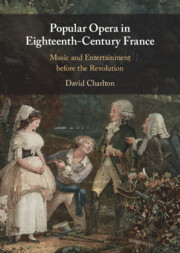Book contents
- Popular Opera in Eighteenth-Century France
- Popular Opera in Eighteenth-Century France
- Copyright page
- Dedication
- Epigraph
- Contents
- Illustrations
- Tables
- Examples
- Preface
- Acknowledgements
- Notes on the Text
- Abbreviations
- 1 Introduction
- 2 Music and Spoken Theatre
- 3 Music in Gherardi’s Company
- 4 Singing and Acting at Home
- 5 Opéra-comique en vaudevilles
- 6 Experiences of Popular Theatre
- 7 Comic and Serious Themes
- 8 Performance as History
- 9 Musical Expansion
- 10 Italian Inroads: The King’s Company
- 11 Six Methods of Synthesis
- 12 A ‘Musico-Dramatic Art’
- 13 Conclusions
- Stage Works Cited
- Bibliography
- Index
5 - Opéra-comique en vaudevilles
Published online by Cambridge University Press: 09 December 2021
- Popular Opera in Eighteenth-Century France
- Popular Opera in Eighteenth-Century France
- Copyright page
- Dedication
- Epigraph
- Contents
- Illustrations
- Tables
- Examples
- Preface
- Acknowledgements
- Notes on the Text
- Abbreviations
- 1 Introduction
- 2 Music and Spoken Theatre
- 3 Music in Gherardi’s Company
- 4 Singing and Acting at Home
- 5 Opéra-comique en vaudevilles
- 6 Experiences of Popular Theatre
- 7 Comic and Serious Themes
- 8 Performance as History
- 9 Musical Expansion
- 10 Italian Inroads: The King’s Company
- 11 Six Methods of Synthesis
- 12 A ‘Musico-Dramatic Art’
- 13 Conclusions
- Stage Works Cited
- Bibliography
- Index
Summary
Chapter 5 offers an account of how vaudevilles were introduced on the Fair theatre stage, and how they were developed as an operatic medium. ‘Raw Materials’ provides contexts for understanding what vaudevilles were and how they were transmitted. ‘Vaudevilles on stage’ uses official reports to build a history of process: how musical dialogue in vaudevilles evolved from 1709. ‘Lyric pantomime’ formed an intermediate stage. Contemporary reactions to Italian recitative are used as a deductive basis for imagining vaudevilles in sound; the enquiry is extended in ‘Accompaniment’ and ‘Continuity’ by historical evidence and through scrutiny of Le Théâtre de la Foire, but also by the author’s report made of a 1991 performance. Historical evidence suggests that performance in Paris was regularly dialogic and spontaneous, not tied to fixed keys or accompaniment, but also sometimes lyrical. Highly expressive vaudevilles were sometimes grouped to form either narrative or sentimental scenes in operas by Lesage and d’Orneval, some works having affinity with common tropes in contemporary novels. ‘La Chercheuse d’esprit’ is an account of Favart’s famous vaudeville opera, here interpreted through unique performative information deduced from a manuscript in the Bibliothèque municipale, Versailles, hitherto unknown to scholarship.
- Type
- Chapter
- Information
- Popular Opera in Eighteenth-Century FranceMusic and Entertainment before the Revolution, pp. 100 - 133Publisher: Cambridge University PressPrint publication year: 2021



